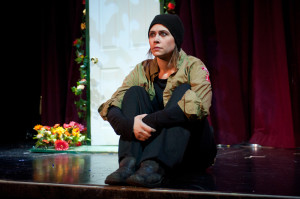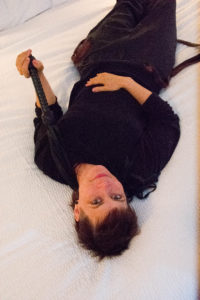 Celebrating one’s changing and evolving identity strongly links to my core belief that our bodies are the only thing we get to wholly own in this lifetime. The Church and State can back the fuck off from legislating bodies unless they’re protecting an individual’s right to do what they deem most appropriate with their own physical self. On Tuesday California made it illegal to give intersex infants surgery in order to make their genitals or body parts more closely resemble typical male or female characteristics. These surgeries have been standard procedure for a long time and have proven to have negative impact on intersex people’s lives physically, emotionally, and psychologically. The state of California ruled on Tuesday that infants cannot give consent, so surgery must wait until they are able to. Go California, well done! Hey, rest of the nation and the world: please follow suit. One of my favorite sentences in the article is:
Celebrating one’s changing and evolving identity strongly links to my core belief that our bodies are the only thing we get to wholly own in this lifetime. The Church and State can back the fuck off from legislating bodies unless they’re protecting an individual’s right to do what they deem most appropriate with their own physical self. On Tuesday California made it illegal to give intersex infants surgery in order to make their genitals or body parts more closely resemble typical male or female characteristics. These surgeries have been standard procedure for a long time and have proven to have negative impact on intersex people’s lives physically, emotionally, and psychologically. The state of California ruled on Tuesday that infants cannot give consent, so surgery must wait until they are able to. Go California, well done! Hey, rest of the nation and the world: please follow suit. One of my favorite sentences in the article is:
In a statement provided to NBC News, [Sen. Scott] Wiener said the resolution “recognizes that California’s intersex community is a part of our state’s diversity and should be embraced.”
Amen. I was born in 1978, 9 years after the Stonewall Riots. In my lifetime much has changed in favor of evolution as it pertains to respecting and recognizing people for who they are, who they love, and in support of bodily autonomy. We have a long way to go, but it felt good reading Tuesday’s news. My own home state of Maine, recently became the third state (plus Washington D.C.) to offer a gender neutral “X” on driver’s licenses. I remember fighting for some of these rights when I was in high school, working on the campaign of our first openly LGBT State Legislator, Dale McCormick. I remember when Maine flip flopped on gay marriage back and forth for years in my 20s (stimulating much family drama).
Not all politics are fought by licking mailers though. These days I’m having the interesting new experience of going out in public wearing flowy slip-dress-like clothing (pretty much the only fabric I can bear putting on my body in this summer humidity) instead of donning more androgynous or butch uniforms. I’ll order coffee somewhere, and from my little bright soft form comes a low and rumbling masculine voice. It feels sensually exciting to me, and the reverberation soothing and joyful. I get looks. No one says a word, and I feel at once proud to be myself, nervous of the judgement I’m perhaps surrounded by, and as though I’m standing my ground in a way which feels right and like “me”. Being. Rooted in this place. Existing. It feels good to exist. It feels good to feel my feet on the ground and know that I am not compromising in order to take up this space I’m inhabiting, not appeasing, not breathing differently, not sucking my stomach muscles in, not smiling to create atmospheric comfort, not covering my body’s hair, not bending into the curves of society in order to be held up, but holding myself upright, supported by the structure of my bones, muscles, skin, and energy. I am here. Getting coffee. Low voice in a dress. This seems silly when written down, but I can’t tell you what an important and empowering feeling it is for me to experience. This is where I am.
I have fought throughout my life to be recognized and accepted by family, friends, lovers, co-workers, and strangers alike. I’ve been fortunate to have a strong bubble around me for much of my time on this Earth — artists, queers, and theater people are all they’re cracked up to be, and though family is sometimes hard, I have always had supportive members walking alongside me.
The other day an old friend told me they considered my gender to be “etherial”. I like that. I dreamed of gender all night last night. I remember floating through the landscape of identity like a ghost, sometimes taking one form, sometimes taking another, mostly feeling changeable and free. I woke up feeling peaceful and smiling. Etherial: Fluidity morphing and developing, without material substance… like my character acting, my shapeshifting self. This suits me, and today some of the news made me smile.
Play On My Friends,
~ Creature
Please support my work on Patreon, or for one time: Support the Artist or email me.
~Thank you.
